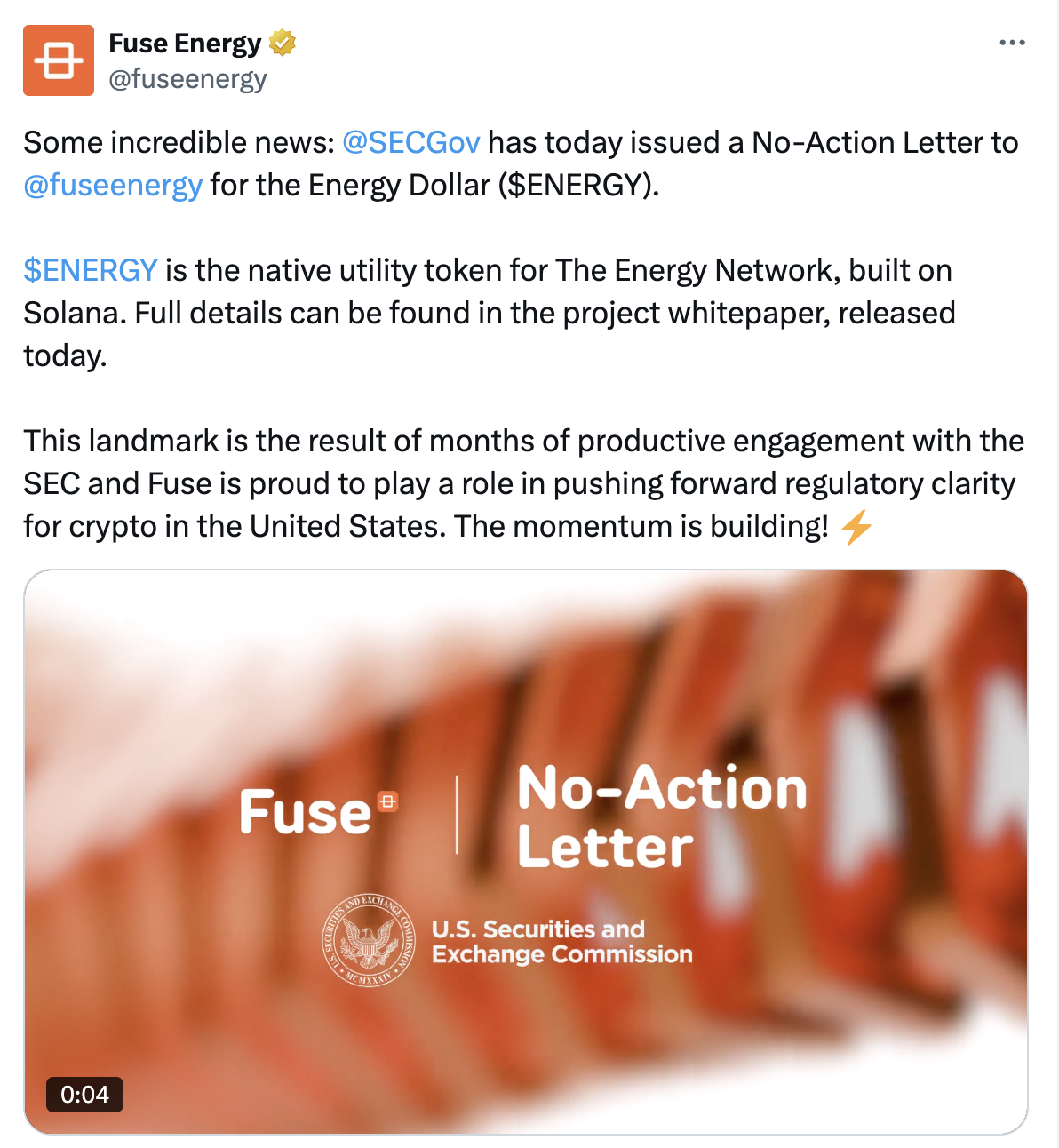SEC Grants No-Action Letter to Fuse Energy
The U.S. Securities and Exchange Commission (SEC) has issued a no-action letter to Fuse Energy, a Solana blockchain-based DePIN project, marking a significant step forward in the regulation of crypto utility tokens. This development, announced in November 2025, reflects a rare instance of regulatory clarity and support for innovative crypto projects that blend blockchain technology with real-world infrastructure.\

Image Source: Fuse Energy
What is Fuse Energy?
Fuse Energy is building The Energy Network, a decentralized grid leveraging Solana’s fast, scalable blockchain to coordinate renewable energy resources such as rooftop solar panels, electric vehicle charging stations, and energy storage batteries. The network operates using its native utility token, ENERGY, designed to incentivize sustainable energy participation rather than speculate for profit. The SEC’s no-action letter specifically states that, under its described offering conditions, the Energy Dollar token will not be treated as a security warranting enforcement action, provided Fuse meets the outlined conditions.
Innovating Energy Grids with Blockchain
The Energy Network by Fuse Energy uses its native ENERGY token to incentivize users who install, maintain, and operate decentralized energy infrastructure. These include households participating in rooftop solar programs, electric vehicle owners contributing charging capacity, and operators deploying battery storage to stabilize grid load. By embedding incentives into blockchain smart contracts, Fuse creates transparent, trustless reward mechanisms that encourage energy-conscious behaviours, helping to ease congestion and increase the efficiency of energy distribution on the decentralized grid.
What Is a No-Action Letter?
A no-action letter from the SEC’s Division of Corporation Finance is an official indication that the regulator will not recommend an enforcement action against a company for a particular activity, in this case, Fuse Energy’s issuance and sale of its native token ENERGY. This letter hinges on the SEC’s assessment that the ENERGY token does not fit the criteria of an investment contract as defined by the 1946 Howey Test, which determines if an asset qualifies as a security subject to U.S. securities laws. Instead, the SEC recognized ENERGY’s status as a utility token. Its value is directly tied to its function within the decentralized energy network, rewarding users for participating in grid maintenance and sustainability initiatives rather than promising profits generated by others’ efforts.
Turning Point for DePIN Sector
Fuse Energy’s success in securing this no-action letter is particularly noteworthy given the broader regulatory uncertainty that has long clouded the DePIN sector, which aims to bring blockchain decentralization to physical infrastructures. Unlike speculative crypto assets, DePIN tokens often represent real-world utility, such as running nodes, providing network upkeep, or contributing renewable energy. With regulators under new leadership, including SEC Chair Paul Atkins and Commissioner Hester Peirce, the agency’s approach to crypto governance has subtly shifted towards accommodating utility-driven projects. Fuse’s letter follows a similar no-action letter granted recently to DoubleZero, another Solana-based DePIN initiative, signaling a growing regulatory willingness to engage constructively with blockchain projects that demonstrate genuine utility and community involvement rather than mere financial speculation.
Implications for Crypto Regulation and Innovation
Fuse Energy’s no-action letter provides much-needed regulatory clarity, often cited by crypto entrepreneurs as one of the biggest barriers to innovation in the U.S. crypto space. It offers a pragmatic path forward for projects leveraging blockchain for decentralized infrastructure by distinguishing between tokens designed for speculation and those that are functional network utilities. This regulatory development is especially timely as the broader Clarity Act remains stalled in Congress. The SEC’s targeted no-action letters fill this legislative void for now, offering tailored, project-specific guidance.
What This Means for Industry
For investors and market participants, the SEC’s supportive stance signals increased legitimacy for utility tokens tied to decentralized infrastructure. It potentially reduces the legal risks around participation in or investment into such projects, encouraging more innovation and capital flow into real-world blockchain applications. Fuse Energy’s achievement also sets a precedent for future DePIN projects that aim to integrate blockchain tokens into physical service networks, such as transportation, telecommunications, and environmental monitoring. Regulatory recognition helps projects gain broader adoption by assuring users and collaborators about compliance and sustainability.





Leave a Comment